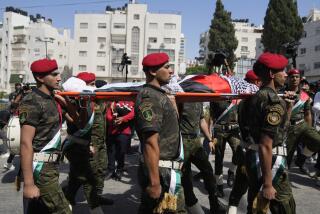Ex-Soldier Guilty of Killing Activist
- Share via
JERUSALEM — An Israeli military court Monday found a former army sergeant guilty of manslaughter in the shooting death of a British peace activist in the Gaza Strip more than two years ago.
It marks the first time during more than 4 1/2 years of conflict in the Mideast that an Israeli tribunal has found a soldier guilty of shooting a foreigner, although the army has informally acknowledged responsibility for such incidents in the past.
The unusual verdict came as the Israeli military has been weathering a wave of international criticism for allegedly failing to properly investigate the deaths of noncombatants during the Palestinian uprising, or intifada, which erupted in September 2000.
Thomas Hurndall, a 22-year-old member of a pro-Palestinian group known as the International Solidarity Movement, was felled by an army bullet in April 2003 as he was trying to shepherd Palestinian children to safety amid fighting in the southern Gaza town of Rafah. He died in a London hospital after nine months in a coma.
The former soldier, Wahid Taysir Hayb, was found guilty by a three-judge military tribunal that heard the case at the army base of Kastina, near the coastal Israeli town of Ashdod. Taysir, a Bedouin with Israeli citizenship, had contended that he was not guilty, and his lawyer accused the army and the court of racism in targeting him.
Human rights groups say the Israeli military routinely makes little effort to investigate the circumstances under which Palestinian civilians and foreigners have been slain during the current conflict. The New York-based group Human Rights Watch said in an exhaustive report released last week that only about 5% of such deaths are investigated.
In addition to the manslaughter charge, which carries a maximum jail term of 20 years, Taysir was convicted of obstruction of justice, soliciting false testimony and giving false testimony. His sentencing is scheduled to take place in August.
The military issued a statement in which it expressed “deepest condolences and sorrow” to Hurndall’s family, but otherwise did not comment on the verdict.
Previously, the army has accused members of the International Solidarity Movement of deliberately putting themselves in harm’s way by conducting protests in active war zones. In March 2003, Rachel Corrie, an ISM activist from Olympia, Wash., was killed when she was run over by an army bulldozer as she tried to block the demolition of a Palestinian home in Rafah.
In the aftermath of Hurndall’s shooting, the military conducted a field inquiry and initially declined to press charges against Taysir, saying there was insufficient evidence. But that decision was reversed after a concerted campaign by Hurndall’s family and supporters.
The judges determined that Taysir, an army sniper who was using a highly accurate telescopic sight at the time of the shooting, had given inconsistent testimony about the incident. At one point the former soldier said he meant only to scare the activist, who was clad in a bright-orange vest, by firing within 4 inches of his head.
“The defendant ... seemed to leap from one version of events to another,” the judges said in their verdict.
Taysir’s lawyers contended that inadequate medical care in Britain had caused or contributed to Hurndall’s death, but the court rejected that argument.
The court found that Taysir tried to get others in his unit to lie on his behalf, saying that he embarked on a “broad campaign of lies and falsehoods to stymie the investigation.” Another soldier has already been sentenced for lying to protect his comrade.
Hurndall, a photography student, was shot while working in the Rafah refugee camp, which was then the scene of daily gunfights between the army and Palestinian militants.
His sister Sophie, speaking from London, told the BBC that the verdict was a relief, but that the family believed a “culture of impunity” existed high up the chain of command in the Israeli military.
Hurndall’s father, Anthony, was in the cramped courtroom at the time of the verdict, sitting a few feet away from Taysir. He called it “limited justice.” An Israeli Arab lawmaker of Bedouin descent, Taleb Sanaa, said that Taysir was being used as a scapegoat by army leaders.
After being removed from the courtroom, Taysir, who was manacled and clad in a black T-shirt, kicked and butted his head at television cameras and onlookers.
His lawyer said an appeal was likely.
*
Times staff writer John Daniszewski in London contributed to this report.
More to Read
Sign up for Essential California
The most important California stories and recommendations in your inbox every morning.
You may occasionally receive promotional content from the Los Angeles Times.










